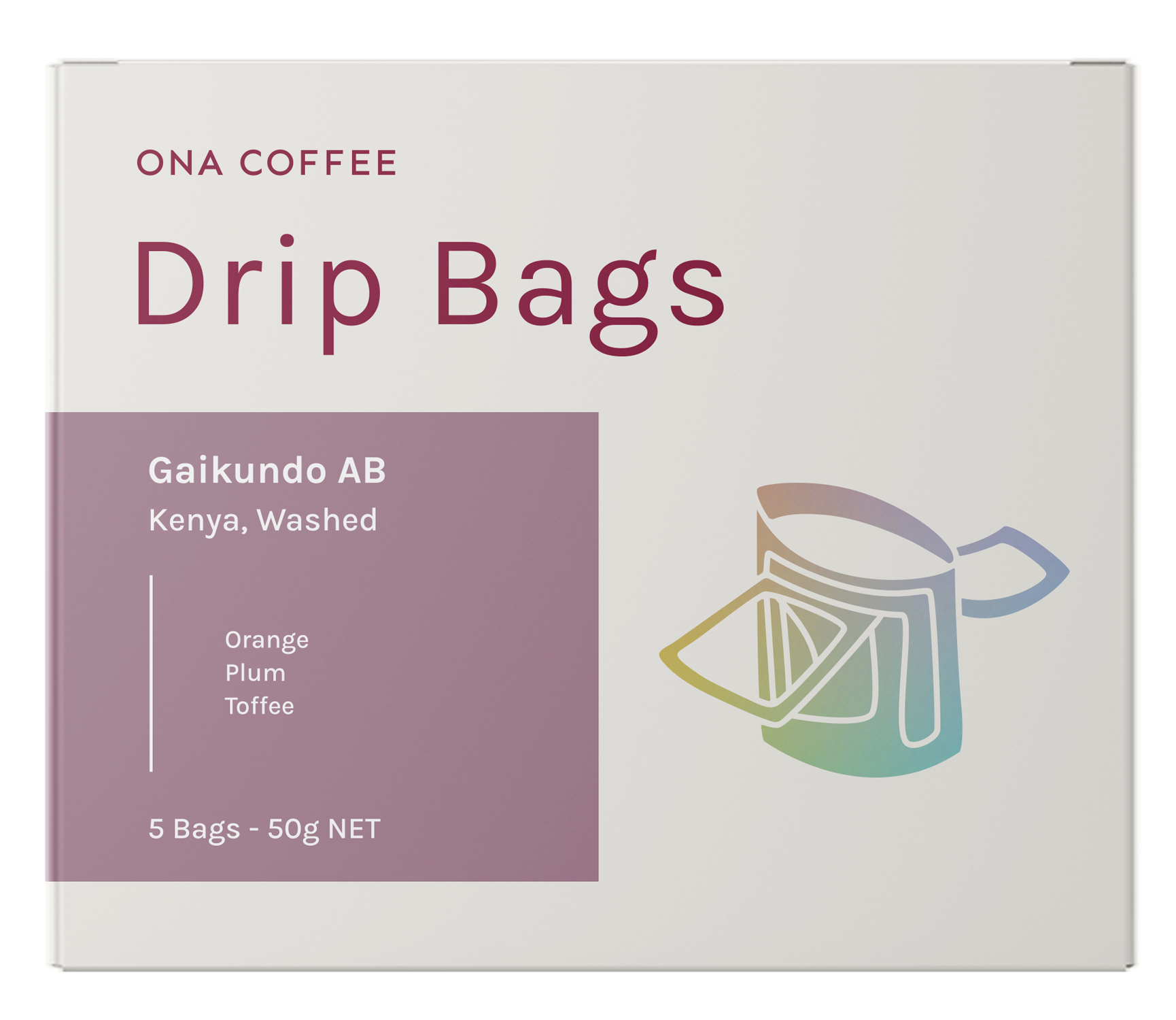
Filter Drip Bag Box - Gaikundo AB, Kenya, Washed
- Regular price
- $16.00
- Sale price
- $16.00
- Regular price
-
- Unit price
- per
Orange, plum and toffee
5x10g bags and 10x10g bags
COFFEE PROFILE
This Washed SL28 and SL34 lot sourced from Gaikundo Coffee Factory is complex and vibrant, with notes of orange, ripe plum, and a sweet toffee finish on the palate.
| TASTES LIKE | Orange, plum and toffee |
| ROAST | Filter |
Story
The Gaikundo Coffee Factory, nestled in Kenya's renowned Nyeri region, is a beacon of quality within the Gaikundo Farmers Co-Operative Society, which includes approximately 1,200 smallholder farmers. Located at the base of Mount Kenya, the factory benefits from rich volcanic soils and a favourable climate, ideal for cultivating premium Arabica coffee.
Coffee here is grown at elevations between 1,700 and 1,732 metres above sea level, contributing to the beans' dense structure and complex flavour profiles. The primary varieties, SL28 and SL34, were developed in the 1930s by Scott Agricultural Laboratories. These varieties are celebrated for their deep root systems, which enable them to thrive in the region's conditions, producing coffees with bright acidity and fruity notes.
The Gaikundo Coffee Factory employs a meticulous fully washed processing method, a hallmark of Kenyan coffee production. Handpicked coffee cherries are pulped, fermented, washed, and then dried on raised beds under the sun. This careful process enhances the coffee's clarity and vibrant flavour characteristics. Gaikundo AB is renowned for its bright and juicy flavours, with tasting notes of raspberry, pineapple, and floral undertones, making it a sought-after choice among specialty coffee enthusiasts seeking distinctive and high-quality Kenyan coffees.
| PRODUCER | Gaikundo Coffee Factory |
| REGION | Nyeri County |
| VARIETAL | SL28 and SL34 |
| PROCESS | Washed |
| ALTITUDE | 1700 masl |

Origin
Nyeri County, Kenya
Nyeri County in Kenya is renowned for its rich history and ideal conditions for coffee cultivation, shaped by colonial influence and smallholder resilience. Introduced by British colonists in the early 20th century, coffee found a favourable home in Nyeri due to its rich volcanic soil, high elevations from 1,500 to over 2,100 metres above sea level, and cool, misty climate. During the colonial era, large coffee estates were controlled by European settlers, while local Africans were prohibited from growing coffee commercially and worked as labourers. The sector was heavily regulated to benefit colonial interests, with the Coffee Board of Kenya established in 1933, largely excluding African farmers from decision-making.
Following Kenya's independence in 1963, the dynamics of coffee production in Nyeri shifted dramatically. Land redistribution and agricultural reforms allowed African smallholders to access land and cultivate coffee independently, leading to the rise of cooperative societies like the Gaikundo Farmers’ Cooperative Society. These cooperatives became central to processing, marketing, and selling coffee, enabling small-scale farmers to pool resources and access quality processing facilities. The SL28 and SL34 varieties, known for their drought resistance and cup quality, thrived in Nyeri's conditions, producing coffees with exceptional clarity, bright acidity, and complex fruit-forward flavour profiles.
Despite facing modern challenges such as aging farmers, youth migration, cooperative mismanagement, and climate change, Nyeri remains a cornerstone of Kenya’s coffee industry. It is celebrated for its smallholder-driven model and unique coffee profiles. Today, producers, cooperatives, and exporters are working together to modernise systems, improve traceability, and secure sustainable livelihoods for the next generation of Kenyan coffee farmers, maintaining Nyeri's prestigious status in the global specialty coffee market.





